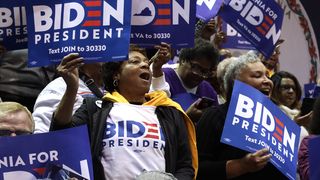In a virtual "Juneteenth" forum, marking the abolition of slavery in the United States, Democratic presidential nominee Joe Biden reflected on the words of legendary abolitionist Frederick Douglass. He said: "It is easier to build strong children than to repair broken men."
Biden now faces a tough choice. If the presidential election were held today, he wouldn't need to harness the incredible power of youth on the streets. He could play it safe and down the line and route a president fumbling dual crises. A president whose solution to slowing the deadly march of the COVID-19 pandemic is to slow down the testing for it. But in doing so, Joe Biden would fall into a pattern that has promised changes for the better, but then has continued to systematically and repeatedly break young black Americans.
In a virtual "Juneteenth" forum, marking the abolition of slavery in the United States, Democratic presidential nominee Joe Biden reflected on the words of legendary abolitionist Frederick Douglass. He said: "It is easier to build strong children than to repair broken men."
Frederick Douglass spoke those words about strong children and broken men directly to white slave owners, a full 10 years before a declaration was read in Texas on June 19, 1865 marking the end of slavery and the date immortal to be known as "Juneteenth". When that declaration was given, southern slaves ostensibly had their freedom. But they also endured an instant humanitarian crisis. Federal troops were needed to build shelters and provide food for the 4 million newly freed slaves, and importantly, to protect them from their former masters. But after a controversial and contested election and the Compromise of 1877, the troops, whose numbers were already dwindling, left. Decades of almost total black voter disenfranchisement in the South ensued, and more than a century of lynchings followed.
During the police-violence-motivated 1992 Los Angeles riots, Bill Clinton, the presumptive Democratic presidential nominee, defiantly vowed that he would heal racial divides in the United States caused by the tumult of a divisive Republican administration.
That same year, The New York Times editors wrote of Clinton that he proved that "it is finally possible for Americans to transcend racial division and look instead to mutual interest". Bill Clinton, of course, won on a wave of support from the black community. He dazzled with a saxophone on the Arsenio Hall Show and was for some years jovially dubbed the "first black president".
But nearly three decades later, it's clear that the racial division was never conquered. Police-violence-motivated riots exploded in Miami in 1995, in Cincinnati in 2001, Ferguson in 2014, Milwaukee in 2016, Charlotte in 2017 and finally across the United States in 2020.
In 2019, a study from Rutgers University showed that "police use of force" is the sixth-most-common cause of death for black men in their 20s.
Three times since the Los Angeles riots, young, black Americans have been told that the Democrats have a president in waiting who is particularly ready to solve the racial divide that they've watched break successive branches in their family tree - and that they fear will break them.
Three times since the Los Angeles riots, young, black Americans have been told that the Democrats have a president in waiting who is particularly ready to solve the racial divide that they've watched break successive branches in their family tree - and that they fear will break them.
Twice before, they have helped usher in that president. When they ushered in Barack Obama, Joe Biden served as his vice-president. Make no mistake, Biden's handling of this moment will comfortably eclipse that of President Trump's, but winning the favour of young, black Americans over Trump is not the trouble for the Biden campaign. The trouble is to not alienate a newly politically activated generation demanding big change, by offering mere promises of incremental progress.
Until recently, the core of Biden's presidential message has been that he alone is well-poised to restore the United States to its pre-Trump place in the world. For many of those who have protested and rioted, the United States for which Joe Biden pined was one that was already hopelessly broken.
There has been no more stark portrayal of that hopelessness than a viral video of an argument between three generations of black men on the streets of Minneapolis. At one point the man urging for calm in the video points and says "because how we're doing it, it ain't working. He's angry at 46, I'm angry at 31. You're angry at 16. You understand me? Putting yourself in harm's way is not the way."
Unless Biden effectively changes his message, it's not clear that voting for him is the way either.
It is easy to forget in Australia just how difficult it can be to vote in the United States. When Georgia held its primary elections on June 9, many citizens in several of its majority minority districts were outright unable to vote due to broken machines, hours-long waits and insufficient balloting equipment. This is in the middle of a pandemic that is disproportionately killing black Americans. Solutions include mail-in voting, but despite studies showing it gives no partisan advantage, the President and Republicans will not stand for it.
In the month since George Floyd's murder, young black Americans have resolved to be strong. Joe Biden now has to show them that he can amplify that strength for good if they vote for him.
Recently released GenForward polling from the University of Chicago shows that in April, despite low-favourability in the Democratic primaries, 84 per cent of young African Americans preferred Biden over Trump and 68 per cent already believed Trump will lose his bid for re-election.
When voting can be so hard, when it can be dangerous to older family members, when the more favourable candidate is one that has built his campaign on a promise to herald the return of a broken system, and when it seems like that candidate is already set to win, there is little incentive left to vote.
In the month since George Floyd's murder, young black Americans have resolved to be strong. Joe Biden now has to show them that he can amplify that strength for good if they vote for him.
So, the former vice-president has a difficult task ahead. As the middling pressure of the presidential election starts to roll in, as President Trump tries to tie him to anarchists and the "radical left", he'll have to convince young black Americans that this time, the change will come. That this time, they're not going to have to watch their children resort to mass demonstrations of anger in the years to come. He'll have to convince them that this time, their vote matters.
For Joe Biden, winning the election is one thing. Shifting the focus to generations of strong, young, black Americans is another altogether.






